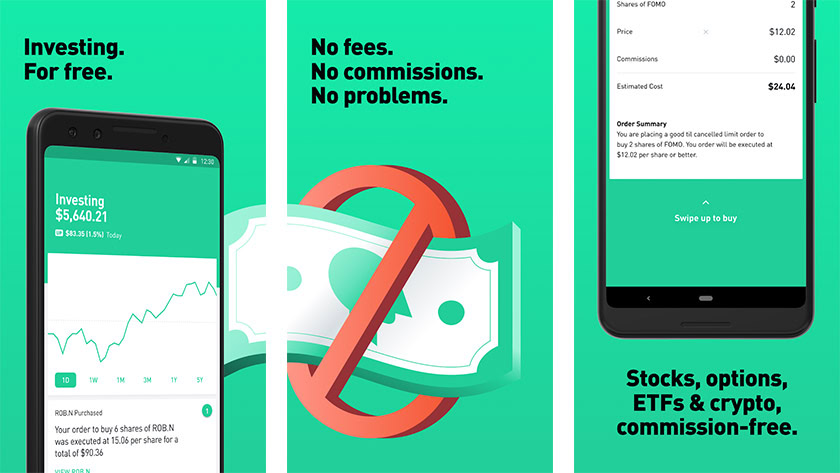Affiliate links on Android Authority may earn us a commission. Learn more.
How to invest as a beginner
How to invest as a beginner is one of the more exciting questions you can ask. Why? OPPOrtunity, wealth creation, and a long-term plan for your future are all goals for investing, and taking even small steps to improve your options is an exciting area you’re beginning to explore.
Remember: everyone was a beginner at some point. Investing is not something taught in most settings, even though some beginner investing tips certainly help.
Disclaimer: This article is for information purposes only. It is not intended to be investment advice. Seek a duly licensed professional for investment advice.
Basic beginner investing concepts
For investment beginners looking to start somewhere, part of the trouble is the finance world has come up with many ways to invest (and jargon to go with it). There are more possibilities than you could ever count for putting your money to work. These include:
- Common investments: Stocks and ETFs (exchange-traded funds), real estate, fixed interest, 401(k), IRAs, Roths, bonds, mutual funds, gold, sustainable investments, gold.
- More advanced investments: Peer-to-peer lending, futures, options, foreign exchange, and more. These won’t be covered here.
The question of how to invest as a beginner can be answered in different ways, and we’ll go through key starting points for beginners to explore:
- Basic investment tips: useful things to understand.
- A closer look at stocks, ETFs, and passive investing, some of the more popular investments and methods, including just what ETFs are all about.
- Investing resources: books to consider reading, podcasts, useful places to go on Reddit, apps, and more. These are resources we use too and might be useful to you.
Just remember you don’t have to do everything at once. Feeling overwhelmed is natural. Take small steps first: get to know the basics, make a plan, and know that you need to educate yourself more to make an investment later on. Everyone who is an investor keeps on learning every day as new ways to look at money emerge.
Take small steps first: knowing the basics, making a plan, and keep educating yourself.
Investing for beginners: Where to start

True investing isn’t just putting your money somewhere and hoping for the best. Investing involves planning, goal setting, and regular check-ups and adjustments on your journey. To succeed in investing, you also need to understand risk, balance risk versus reward, and take a long-term approach with your money, while ideally setting up a balanced portfolio.
Advice from experts varies in suggested investments, but rarely does it stray from a few common truths: balance your risks with stable investments, try to minimize fees that can eat away at any gains, don’t try and time the market, and consider tax.
Read more: How to invest $100: Small steps that can put you on the right path
You may wish to start investing with the help of a financial advisor, an accountant, or through your own research and discovery, which is what we focus on here. However, knowing as much as you can, even when engaging a professional, is useful to better understand the process.
Let’s look at each element mentioned above.
Balancing risk: Growth vs yield, time, and asset allocation
A key point: Risk, in investing terms, relates to the likelihood that an investment’s gains will differ from an expected outcome. Specifically, the higher the risk, the higher the chance an investment goes bust.
How much risk you are willing to take is related to your age, portfolio size, and appetite for risk. Quite literally, if you’re investing in stocks or assets that keep you awake at night, it’s not healthy for you.
Broadly, younger people should feel more comfortable taking much-longer term growth views about stocks, because broad averages play out over decades. Ups and downs happen, but taking a long view means weathering any storms and enjoying good years together. Time is your friend.
Growth investing can mean investing in companies that have good long-term prospects, but right now haven’t made it yet. Examples include growth stocks or ETFs in the technology sector or investing in housing in areas that are hoped to improve but aren’t there yet.
How much risk you are willing to take is related to your age, portfolio size, and your appetite for risk.
Newer people closer to retirement will be more worried about their investments over the short to medium term. A single downturn could be enough to wipe out large chunks of their investments, with limited time to recover. Most older people will be seeking safer bets, with diversified options that generate yield or income, like bonds, defensive stocks, or ETFs with dividends, rental returns from property, or fixed interest.
One other consideration: passive vs active investing. Passive investing generally involves limited buying and selling. Most passive players don’t change their investments. Active investors may not buy and hold for long periods, preferring to move their money around. Generally, active investing is seen as riskier.
Minimize costs, fees, and avoid scams
Good news! It’s quite easy to put your money into investments. Bad news: that can easily mean trouble. Lots of investments aren’t good ideas: too costly, too many fees, or outright scams.
Every single asset class in existence has at least a few schemers hoping you’ll fall for their bait. Everyone wants to get rich quick, many people can be tempted to overlook red flags due to smooth tactics and greed.
Investing isn’t a get-rich-quick-scheme, and investing should never be gambling. It’s a fine line at times, but gambling is usually a bet on a win/lose scenario, while investing is long-term, strategic, and considered.
But what some new investors don’t realize is how important it is to avoid fees, charges, and unnecessary taxes. More on taxes later.
Fees: Fees and costs associated with making and managing investments are enormously important to check. Many companies, accountants, and advisors running mutual funds or managing portfolios charge fees as a percentage of assets, along with administrative costs. Fees must be disclosed as expense ratios, but the money amounts are often hidden.
What it means: An expense ratio of 0.7% per annum means that each year 0.7% of the fund’s total assets will be used to cover expenses. Less than 1% doesn’t sound like much, but if you make a $50,000 investment, that amount is equal to $350 per year. A typical year in safe investments might only net you a 5% before-tax gain. Then, take out tax and fees, and your return might fall below 4% or less.
Thankfully, this is 2021! Extremely sophisticated, low-cost options exist for investing in most asset classes, as well as funding your retirement. Good advice is easier and cheaper to get than ever, including robo-advisors that base investing decisions on algorithms that adjust to your age, investment size, retirement expectations, and risk appetite.
Tax: Know how it works

Depending on your state and territory, or country of residence, the taxman might be interested in the gains you make from your successful investments. Your local laws are worth knowing. The key isn’t to avoid taxes, which will just spell trouble but to avoid paying unnecessary taxes, and learn about government-led schemes that provide useful savings.
Some investments may allow investors to reduce their taxes when saving for retirement, such as through IRAs and Roth IRAs. Many tax breaks exist to support investments that benefit people as they plan for retirement, which reduces the burden on social security.
Tax doesn’t just apply to capital gains, either. Happily, if you make a loss on an investment, the IRS will generally consider that loss in the years ahead, and you can offset any gains with the loss to avoid paying tax. It’s not as good as just making a successful investment, but it’s fair.
Beginner investment options: ETFs and stocks explained

Remember I said that this is 2021? One modern way to invest is through index funds, also known as exchange-traded funds, or ETFs.
ETFs are an extremely hot topic for investors partly because of their low fees, partly because of how they work, and their affordability. ETFs have created easy exposure to a huge range of markets and investment types.
Exchange-traded funds (ETFs) or index funds explained:
- Index funds or ETFs are share portfolios managed by a company that are designed for one purpose: to track a share index, such as the S&P 500, or NASDAQ-100, global share markets, the price of oil, or a combination of indices. Each ETF is approved before being placed on the market, and has a specific tracking approach.
- A range of ETFs can be listed on a market. You can buy one share in an ETF, which then tracks a certain market index.
- The old approach was to invest in funds by giving the funds money. With an ETF, you essentially buy the fund on the market, which provides much better liquidity and much more visible pricing.
- How are ETFs typically used? For example, buying one share in a broad index S&P 500 ETF means you are effectively buying 500 stocks in one. As the index moves up and down through each trading day, so will the ETF, and, therefore, your portfolio value.
- Why ETFs? A sad truth is that most money managers that you pay fees to cannot beat the market. By using an index fund to invest, you get the market return less fees. ETFs are so popular and have low costs to maintain that they generally pass on very low fees. Warren Buffett has made huge bets that passive investing beats active investing, and ETFs are often considered useful for passive investing. This makes ETFs attractive for regular folks and big finance as well.
- Whereas in decades past, funds and money managers might charge 1% or more of your portfolio in fees each year, ETFs may charge between 0.1-0.2%, or lower, or even zero percent in some cases.
What are the downsides of ETFs? The number and size of ETFs has grown dramatically, with more than a trillion dollars now invested in ETFs on the US market alone. Some critics say they are too big and cause market problems during volatile periods. Some ETFs are also riskier, have higher fees, and may be harder to sell when you need to. Large, popular ETFs generally avoid those problems.
To provide a guide, we asked Lauren Wybar, a senior financial advisor with Vanguard Personal Advisor Services, to explain an example of one of the Vanguard ETF ranges that meets the super-low fee, low cost of entry requirements:
“With ETFs, the minimum requirement is just the cost of a single share. Vanguard Total Stock Market ETF (VTI), for example, is currently trading at $141, and the expense ratio is just 0.03%,” Wybar said via email. “There are no commissions to trade on Vanguard’s brokerage platform, and the account service fee is waived by signing up for e-delivery.”
Wikipedia maintains a list of all American exchange-traded funds allowed by the SEC. The SEC also has a PDF explainer on ETFs.
Where to next? More for beginners

Next tip: Educate yourself. Here are some resources to consider. These are a few useful highlights; if just one or two options appeal to you to find out more information or to regularly read, that’s enough! (Remember, you don’t have to know everything at once.)
Subreddits:
- r/personalfinance — a big, busy subreddit covering everything from budgeting to investing. Personal but always interesting. Tip: Using this filter will limit topics to investing topics only.
- r/investing — a focused subreddit but with investing news and views too. This list of FAQs is a great point to start, and come back to.
- r/bogleheads — a small subreddit devoted to long-haul, passive investing champion John Bogle, who founded Vanguard.
Books:
- The New Coffeehouse Investor: How to Build Wealth, Ignore Wall Street, and Get on with Your Life – by Bill Schultheis. A commonly gifted book to new investors. Take my advice: buy a used or second-hand edition listed as in good condition or better, and save. Frugal wins every time!
- Investing for Dummies. Don’t overlook this book, it contains loads of useful advice that can help. Again, buy used, save your cash.
Podcasts:
- NPR’s Planet Money and The Indicator.
- Listen Money Matters.
- Radical Personal Finance.
- For Australians only: The Money Cafe.
Apps:
- Here’s a list of the best investing and finance apps, which includes Acorns, Robinhood, Investing.com, M1 Finance, JStock, MyStocks, and StockTwits.
If you have any recommendations on good places to start investing for beginners, feel free to leave them in the comments. Or, if you have any beginner questions (we cannot provide investment advice) on what something means or jargon, let us know below.